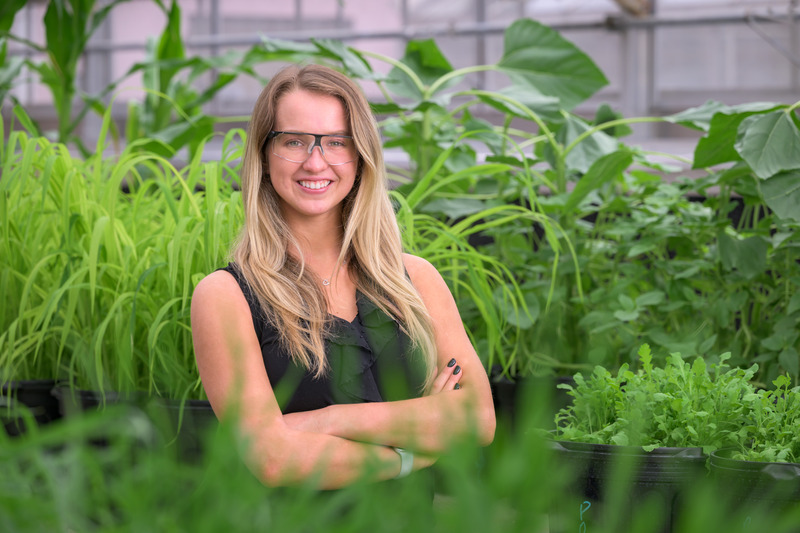


Double the degrees
Photo by Evan Krape April 02, 2024
UD’s statistics 4+1 program gives Audrey Bufano valuable internship experience while earning both undergraduate and graduate degrees
The University of Delaware’s 4+1 programs provide students with a fast-tracked path to both an undergraduate and master’s degree. Although relatively new, the B.S./M.S. in Statistics 4+1 program is launching Blue Hens into a wide range of careers.
With the high demand for statisticians in seemingly every major industry, two degrees in five years seemed like a rigorous but financially smart opportunity for students like Audrey Bufano. Now in her graduate student year, the Wilmington, Delaware, native earned her bachelor of science in statistics degree in spring 2023 and jumped right into her graduate coursework.
In the master’s year, Blue Hens choose between non-thesis options, an internship or a thesis to complete their second degree. Bufano took the internship path, landing a position with FMC, a global agricultural sciences company only a few miles from UD’s Newark campus.
“The internship program that UD did with the 4+1 program is like a substitution for a thesis,” Bufano said. “It’s a great opportunity for getting hands-on and real-world experience.”
Bufano honed her coding knowledge, using computer programming to help companies make informed business decisions.
“Audrey’s current work focuses on preparing summary reports for studies done by weed scientists, plant pathologists and nematologists to understand how product performance is impacted by different environmental factors,” said Melissa Ziegler, Bufano’s supervisor at FMC.
Bufano is working with an herbicide discovery group on which compounds they should use for the best possible crop yield. This type of work is critical to developing and improving crop protection products.
Not only is she strengthening her coding skills through this internship, she also appreciates learning how a corporate environment functions.
“That has been really beneficial — you don’t necessarily get that in school,” Bufano said.
Throughout their undergraduate statistics coursework, students take several computer science, economics and critical thinking courses on top of their core statistics courses.
“All of that experience with data from a theoretical standpoint and also on the applied side that [Audrey] is getting in this program positioned her really well for an internship there at FMC,” said Bryan Crissinger, senior instructor in the Department of Applied Economics and Statistics. “Any sort of skills that would require working with data — research and product development lands squarely in Audrey’s wheelhouse.”
Working with data in any context — from working with Excel formulas to learning complex coding and programming — prepares students for the 4+1 program and lifelong careers in statistics.
“To excel in statistics, students need to have an interest in manipulating data and be comfortable working within the intersection of math and data science,” Crissinger said.
In addition to being comfortable with manipulating data and statistical thinking, Ziegler also feels that people within the field need to have a more holistic view of the problems they’re tasked with.
“What separates good from great is the ability to understand the business or scientific context of a problem, identify the critical questions that should be answered and then communicate the results to a non-technical audience,” Ziegler said.
During her time at UD, Bufano enhanced her statistics degree with a minor in computer science. She found the applied database management courses that dive into the SAS coding language particularly useful.
“That’s 90% of what I do on a daily basis at FMC,” Bufano said. “Having a computer science minor is valuable because, wherever I go, it will involve computer programming. I don’t yet know what language I’ll use or in what context, but it will involve processing and analyzing data all day.”
On top of her computer science experience, Bufano learned a great deal about the business.
“I took business development courses that helped with soft skills,” Bufano said. “I networked and developed personal relationships with professors. Once a UD faculty member knows you and what you’re interested in, then they connect you with others who may be looking to hire in that field.”
In the future, Bufano hopes to branch out and explore how she can use her skills in statistical analysis across career fields such as scientific research or sports.
“I know that UD statistics graduates find it pretty easy to come out and get jobs just because of the skill set they have,” Crissinger said. “It’s a skill set that is in-demand these days.”
As Bufano approaches the final semester of her UD academic career, she reflected on her educational and personal journey.
“A lot of great experiences built me into the person I am today versus the one I was four and a half years ago when I started my college career; UD has provided a lot for me,” Bufano said. “I am a big efficiency person, which the 4+1 is great for, and I just appreciate this opportunity very much.”
Contact Us
Have a UDaily story idea?
Contact us at ocm@udel.edu
Members of the press
Contact us at 302-831-NEWS or visit the Media Relations website

